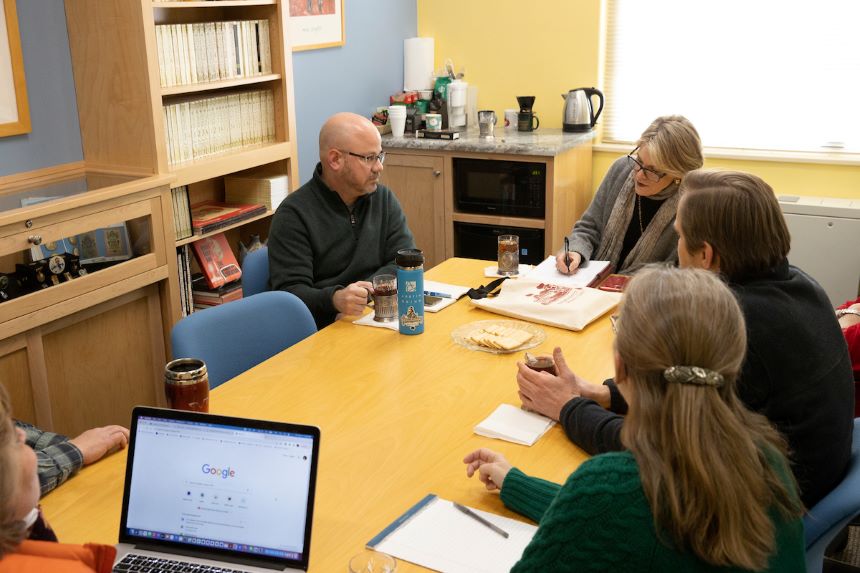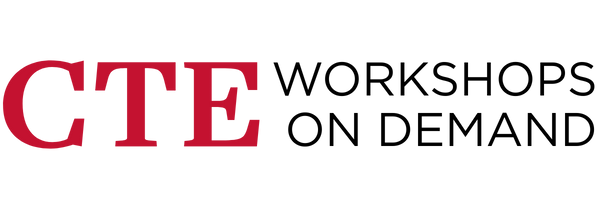
CTE Workshops on Demand
CTE leaders (Ellen Yezierski and Gregg Wentzell) can deliver scholarly, interactive, and relevant in-person faculty development workshops on teaching straight to your department! Workshop scheduling and duration are customized to departmental needs. Workshops have been evaluated favorably by colleagues and continuously improved to maximize faculty engagement and application.

How can my department request a workshop?
Chairs or Program Directors identify workshops from the menu below that meet the needs of their instructors and submit the CTE Workshops on Demand Form. Here chairs select the workshop(s) of interest, duration (45-60 min., 90 min., 2+ hr.), and desired dates and times. We require two weeks of lead time to schedule workshops and welcome requests for fall, winter, and/or spring terms. Please direct any questions about Workshops on Demand to CTE@MiamiOH.edu.
If you’re not a department chair or program director and wish to have one or more of the above workshops come to your department, please talk with your chair or director and share this page.
Workshop Menu
This hands-on workshop provides strategies to improve your use of Generative AI (Gemini, ChatGPT, Claude, etc.) to support your teaching. Workshop activities focus on prompt engineering coupled with infusing language about research-based teaching practices. Learn how to generate useful outputs that help instructors brainstorm and craft assignments and assessments that can improve instruction and student learning.
Do you want to design group work activities that will engage students with course content, build community, and lead to deeper, more lasting learning? In this highly interactive session, we will explore research-based best practices to promote collaborative learning among students. We’ll review what the research says, and, with a focus on implementation, we will evaluate the utility and application of the techniques for our particular instructional goals and course contexts. The aim is to make intentionally designed collaborative learning techniques a more integral part of how we teach so that students learn best.
This interactive workshop will engage participants in evidence-based active learning and assessment strategies designed to inspire enthusiasm for and innovation in teaching. Participants will engage innovative, research-based instructional strategies to invigorate their teaching practice, engage in reflective discussion, and explore ways to adapt approaches to their disciplinary contexts to promote deep student learning and enhance teaching satisfaction. A “care package” of resources from the Center for Teaching Excellence will support participants’ continued instructional growth. Rediscover your passion for teaching in this lively session!
Peer review of teaching is often included in the evaluation of faculty as part of the tenure and/or promotion process. When implemented with fidelity, peer review of teaching provides formative and constructive feedback to instructors with a focus on the continuous improvement of teaching and learning. This session engages departments in developing knowledge and expertise to maximize their PRT processes.
This session focuses on using midcourse evaluation tools to evaluate the degree to which components of a course facilitate student learning. Administering these tools allows the instructor to collect student data, respond instructionally, and evaluate the efficacy of such responses. Not only can midcourse evaluation improve courses for students, it can also serve faculty seeking advancement by generating data that can be used to document efforts to improve teaching effectiveness. Participants will discuss midcourse evaluation considerations and learn about the tools they can use for formative teaching improvement.
Are you interested in improving your teaching by increasing student engagement and replacing teacher-centered lectures with student-centered learning experiences? Learn how to center students in discipline-specific, in-class, concept-building/application activities by using a new custom GPT, the Classroom Activity Builder (CAB). The CAB is based upon a research-based model known as POGIL or Process-Oriented Guided Inquiry Learning. Laptops required.
Metacognition—the ability to think about our thinking, judge our level of learning, and be consciously aware of ourselves as problem solvers—is crucial to students’ development and success as learners. The goal is for students to learn to practice metacognition as a habit of mind. In this session we will explore strategies for helping students develop their metacognitive abilities during class sessions, when studying or working on assignments outside of class, and before and after test-taking or other evaluation situations. Participants will leave the session with strategies for helping their students use metacognition to become self-reflective, deep learners.
When students’ ideas about learning are inaccurate, drive unproductive studying, and impede progress, how can we support changes to their practices? This session explores ways that instructors can help students maximize their learning outside of the classroom. Drawing on the work of psychologist Robert Bjork and teacher-scholars James Lang and Saundra McGuire, participants will engage strategies for students to confront inaccurate ideas about learning, become empowered learners, study more effectively, and improve time management.
The construct of desirable difficulties provides a useful framework for improving student learning. Robert and Elizabeth Bjork describe desirable difficulties as tasks that require considerable effort and desirably improve long-term performance and transfer. Participants will explore and discuss desirable difficulties and related learning principles (e.g., tasks and feedback that improve learning) and investigate how to use desirable difficulties to reform activities and courses.
Mindsets—beliefs about our ability to grow and succeed as learners—are crucial to students’ intellectual development and success. This session will explore evidence-based strategies for overcoming challenges posed by faculty and students’ mindsets to improve our teaching and our students’ learning.
In this workshop, instructors will apply a framework for understanding student intellectual development and learning to think in different disciplines with the aim to optimize student learning conditions. The framework comes from Janet Gail Donald's Learning to Think: Disciplinary Perspectives volume that draws on 25 years of research on how students and faculty perceive learning in their fields. The work is complemented by research on intellectual development as well as student orientation, motivation, and goals. Bring your laptop.
Do you want to plan class sessions that will maximize your teaching skills and your students' learning? Scholarly teaching is the key! Participants in this session will be introduced to the steps of the scholarly teaching process with a focus on how to (1) incorporate the teaching and learning literature and (2) analyze and reflect on assessment results. The scholarly approach presents continuous opportunities for new learning by both students and teachers. Join us for a lively and interactive session!
Flawed test items decrease the validity and reliability of test scores as well as distort inferences about learning drawn from such scores. In this seminar, you will learn how to detect and correct item-writing flaws in items you use in clicker questions, homework, quizzes, and exams. The literature on item-writing flaws primarily addresses multiple-choice items; however, the techniques may also be applied to free-response questions. Participants personally evaluate their own items during the seminar, so be sure to bring some hard copies of items.
Learn about Karplus’ learning cycle and how it can be used in small or large courses. Participate in a learning cycle activity, a debrief of its characteristics, and uncover ways to move from a lecture-based to a lecture-less launch of new content, and examples of classroom materials.
Neuromyths, or misconceptions about the science of how people learn, can pose problems for teaching and learning. Research shows that students, instructors, and even those with high exposure to neuroscience consider various neuromyths to be true. In this session we’ll identify the neuromyths we hold as facts, counter them with findings from research, and generate neuro-factual, research-based ways to align our teaching goals and approaches. Come prepared to make some surprising discoveries that will transform your classroom.
According to Craig Nelson in his article "Dysfunctional Illusions of Rigor: Lessons from the Scholarship of Teaching and Learning," many well-meaning instructors base their teaching practices in unrealistic or inaccurate perceptions of what makes courses challenging. Overcoming these "dysfunctional illusions of rigor" requires instructors to re-examine their beliefs about effective teaching. In this workshop we'll review Nelson's list of illusions and explore some alternative views that lead to more effective student learning.
How clearly are you communicating your course assignment purposes and expectations to students? Transparent assignment design has been shown to enhance engagement while increasing students’ potential and motivation to succeed and reducing inequities in the learning process. In this session we’ll explore specific ways to implement transparency in your assignments to improve students' success. Participants are encouraged to bring a course assignment they would like to revise for greater transparency.
How do the ways students learn impact their success in a course? In this session we will explore the implications of prominent theories from the science of learning for teaching practice. Questions we will consider include “How does the way students organize knowledge impact learning?” “What kinds of practice and feedback enhance learning?” and “What motivates students to learn?” Session participants will engage in various teaching and learning scenarios to apply best practices from learning theories to their own instructional practice. Adopt theory-based practices, and set your students on the road to becoming self-directed learners!
